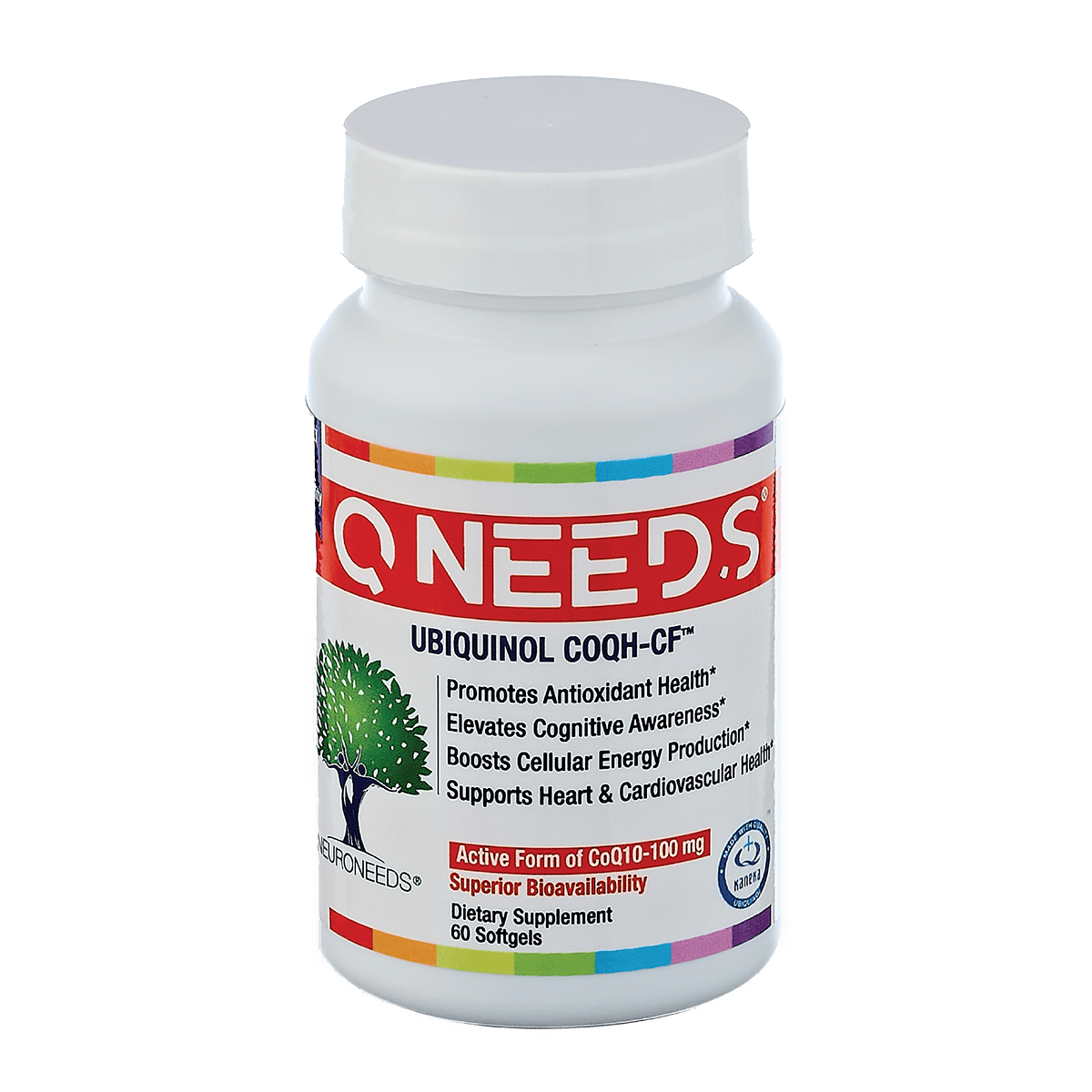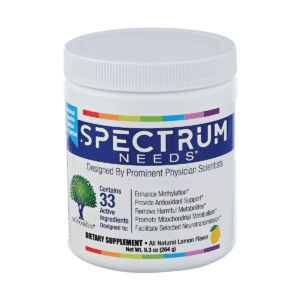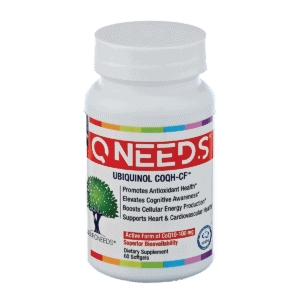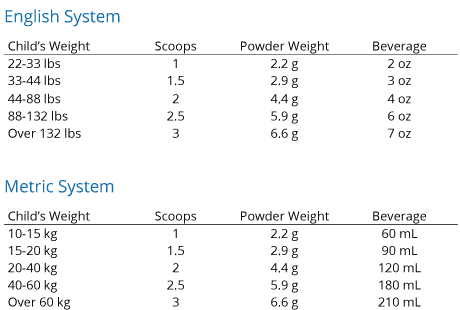$84
Flavor Saver
$211.00
What is Auto Ship?
Take the worry out of reordering and save money on the supplements you love!
Auto Ship makes it easier than ever to get your favorite NeuroNeeds dietary supplements-and to keep them coming. When you select Auto Ship you’ll get free shipping (US only) for extra savings. Just choose the Auto Ship option on the items you’d like to receive a fresh monthly supply of, and we’ll take care of the rest. It’s that easy! Stop worrying about when it’s time to reorder and lock in free shipping today!
*Starting 20, 30, or 60 days from your order date, you’ll receive a new 30-day supply at the guaranteed low price per shipment, which will conveniently be charged to the card you provide today unless you call to cancel. To customize this program or future shipments and charges, please call (860) 434-7777 from 8am – 5pm EST, Monday through Friday.
SpectrumNeeds®, contains 33 active ingredients, and is designed to promote mitochondrial support, neuro-protection, and act as an excellent source of micro-nutrition. QNeeds® contains Kaneka®-brand ubiquinol, a proven source of superior bioavailability of CoQ10. SpectrumNeeds® and QNeeds® are designed to be taken together.
Spectrum Needs Description
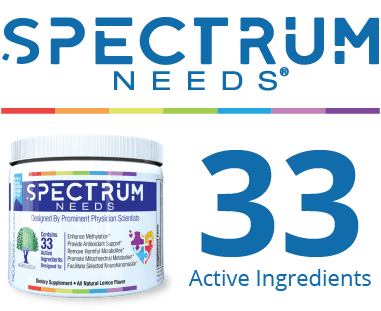
SpectrumNeeds® includes nutrients that:
Promote mitochondrial energy metabolism. Generate essential cofactors, such as coenzyme A. Provide strong antioxidant support for free radical removal. Remove harmful metabolites, including certain organic acids. Enhance methylation needs, and thereby assist in gene regulation. Facilitate selected neurotransmission, including GABA receptors. Protect the nervous system, including by reducing NMDA glutamate receptor activity. Assist in the regulation of insulin control. Improve small vessel circulation in the brain. |
SpectrumNeeds® contains 33 all-natural active ingredients, including 20 different mitochondrial-targeted nutrients ("mito-cocktail”) plus additional nutrients aimed to promote methylation, neurotransmission, and neuro-protective functions. In addition, SpectrumNeeds® is an excellent multi-vitamin and mineral source. SpectrumNeeds® is designed to be safe and effective in all individuals regardless of age, gender, presence or type of neurodevelopmental conditions, common comorbidities, severity of disease, DNA sequence information, medications, or other supplements taken. The formulation is in particular tailored to the dietary needs of children and adults with autism and related neurodevelopmental disorders. In particular, SpectrumNeeds® includes many essential nutrients that are often deficient in individuals with autism. However, SpectrumNeeds® can be taken by all individuals who desire a basis of excellent nutritional and dietary interventions to promote improved energy metabolism, methylation, and neurotransmission.
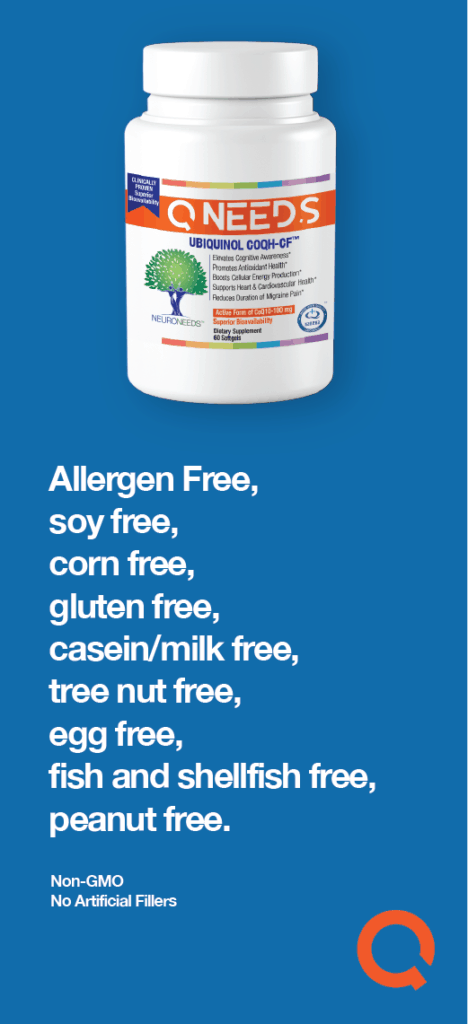 Coenzyme Q10 (CoQ10), a mainstay of the “mito-cocktail”, is a natural nutrient that plays a critical role in the production of energy by the mitochondria within cells. CoQ10 serves as an essential electron carrier in the respiratory chain, whereas almost all of the energy for the body is produced. It also functions as an antioxidant, which protects the body from damage caused by harmful molecules. There is a substantial amount of CoQ10 in SpectrumNeeds®, all in the ubiquinone form for stability purposes. However, research along with patient blood monitoring suggests that ubiquinol (in the liquid form) offers superior bioavailability, resulting in better absorption of the nutrient from the gut into the blood. QNeeds® is a patent-pending 100-mg ubiquinol small-sized softgel sourced from Kaneka®, that is offered in a completely soluble, liquid, crystal-free solution, clinically proven to provide superior bioavailability.
Coenzyme Q10 (CoQ10), a mainstay of the “mito-cocktail”, is a natural nutrient that plays a critical role in the production of energy by the mitochondria within cells. CoQ10 serves as an essential electron carrier in the respiratory chain, whereas almost all of the energy for the body is produced. It also functions as an antioxidant, which protects the body from damage caused by harmful molecules. There is a substantial amount of CoQ10 in SpectrumNeeds®, all in the ubiquinone form for stability purposes. However, research along with patient blood monitoring suggests that ubiquinol (in the liquid form) offers superior bioavailability, resulting in better absorption of the nutrient from the gut into the blood. QNeeds® is a patent-pending 100-mg ubiquinol small-sized softgel sourced from Kaneka®, that is offered in a completely soluble, liquid, crystal-free solution, clinically proven to provide superior bioavailability.
SpectrumNeeds® and QNeeds® are designed to be taken together, including in individuals that present with:
• Any neurodevelopmental disorder, including autism, autism-like conditions, ADHD, and intellectual disability.
• Any neuropsychiatric disorder, including anxiety, depression, bipolar, panic, OCD, and psychosis.
• Any functional disorder, including migraine, fibromyalgia, and other causes of chronic pain, cyclic vomiting, chronic fatigue, gastrointestinal dysmotility, and dysautonomia.
• Anyone with a mitochondrial disorder or mitochondrial dysfunction.
DOSING:
Dosing of SpectrumNeeds® and QNeeds®, as with any dietary supplement, is individualized, and best discussed with your physician. There are many factors involved in dosing, including age/size, condition and severity, blood levels of key nutrients, and individual tolerances. With those caveats, in order to provide a high-degree of antioxidant support, Dr. Boles often recommends the following starting dosing in his patients:
Children 20-40 kg (44-88 lbs):
- SpectrumNeeds® two scoops twice daily (4 scoops per day)
- QNeeds® 200 mg twice daily (4 gel capsules per day)
Adults 60 or more kg (over 133 lbs):
- SpectrumNeeds® three scoops twice daily (6 scoops per day)
- QNeeds® 300 mg twice daily (6 gel capsules per day)
SUPPLEMENT FACTS SPECTRUM NEEDS
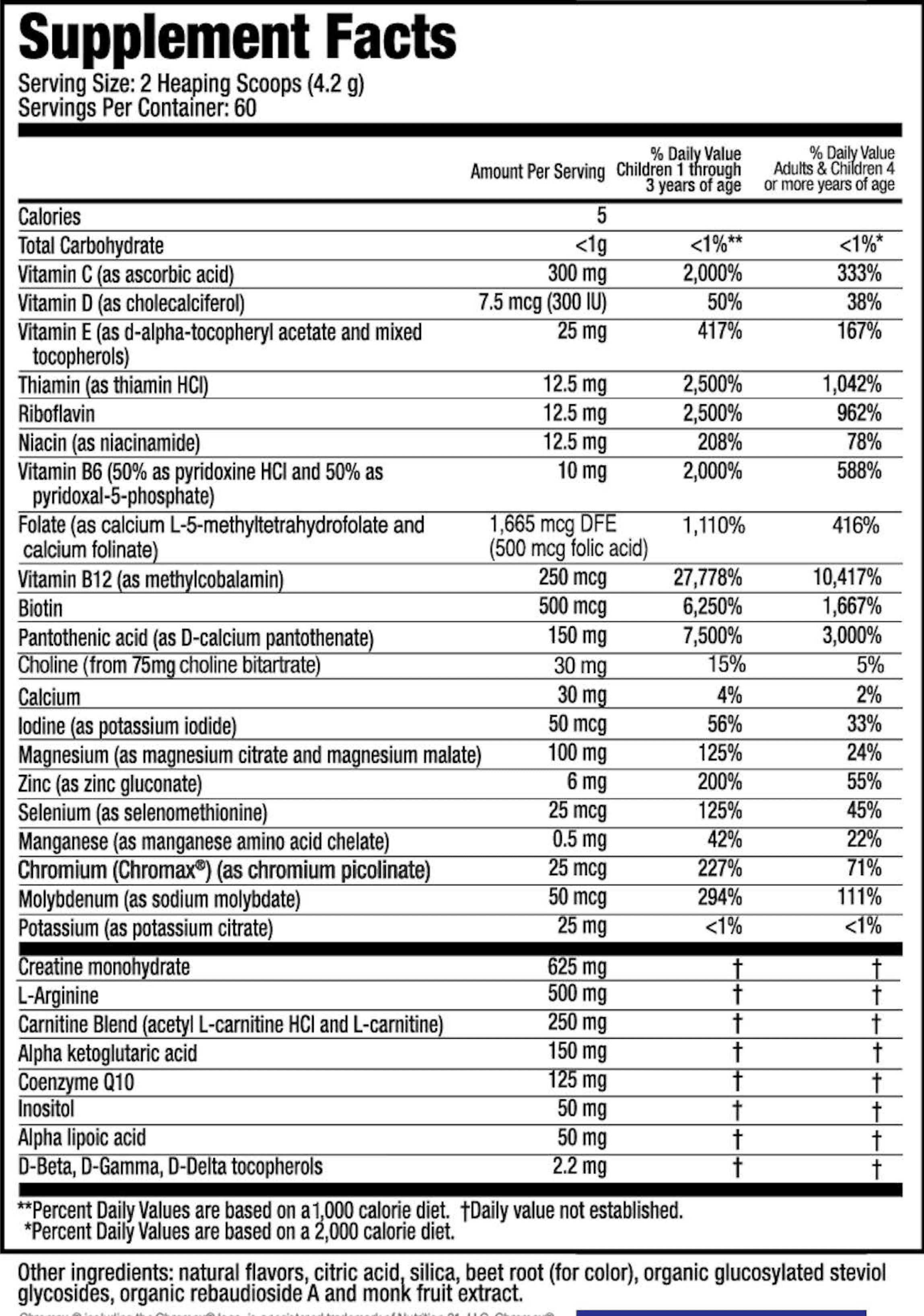
SUPPLEMENT FACTS QNEEDS
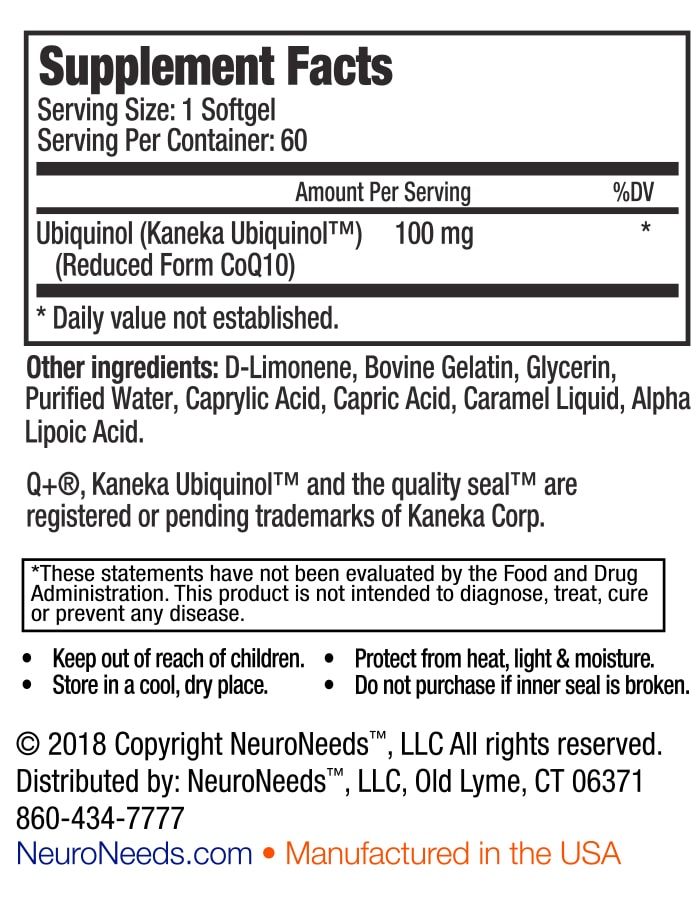
Bioavailability and Stability QNeeds
Bioavailability and Stability
Extracted from the oil of citrus fruits, food-grade d-Limonene acts as a non-polar organic solvent that solubilizes CoQ10, without causing significant chemical interactions or degradation. The end result is a liquid, crystal-free, completely soluble CoQ10 — providing superior bioavailability — that does not require heat or synthetic chemical solvents and that fully resists recrystallization at ambient temperatures.
Researchers compared the oral bioavailability of a single dose of 100 mg of Kaneka® ubiquinol, as a hermetically sealed softgel, versus a single dose of 100 mg of a standard CoQ10 supplement, consisting of crystalline powder in a two-piece hard shell. Ten subjects over 60 years of age participated in this randomized, double-blind, two-arm crossover human clinical trial published in the Journal of Functional Foods. Clinical trial published in the Journal of Functional Foods Compared to CoQ10 crystalline powder, supplementation with Kaneka® ubiquinol achieved:
- Significantly higher plasma concentrations of CoQ10 at 5, 6, 8, 12, 24, 48 and 72 hours post-dose.
- 4.3 times higher plasma area under the curve of reduced and total CoQ10.
- 3.3 times higher plasma area under the curve of oxidized CoQ10.
- Faster peak blood levels of CoQ10, with total CoQ10 reaching maximum plasma concentrations 15.5 ± 29.6 hours after supplementation, versus 26.5 ± 25.8 for CoQ10 crystalline powder.
The researchers concluded that “...reduced Coenzyme Q10 liquid softgel formulation was found to be superior to the commercial formulation of Coenzyme Q10 for bioavailability.”
Increases Nutritional Support
SpectrumNeeds® takes into consideration the scientific research and clinical experience illustrating that people with autism spectrum and other neurodevelopmental disorders function better when certain nutrients are supplemented at high doses; This is WHY our product includes high doses of: carnitine, coenzyme Q10, magnesium, pyridoxine, vitamin B12, and vitamin D3
Promotes Mitochondrial Metabolism
SpectrumNeeds® takes into consideration the scientific research that reveals about one-half of individuals on the autism spectrum have mitochondrial deficiencies; This is WHY SpectrumNeeds® was devised with a blend of the nutrients that can assist in mitochondrial function (energy metabolism): acetyl L-carnitine, alpha ketoglutarate, alpha lipoic acid, L-carnitine, citrate, coenzyme Q10, L-creatine, magnesium, zinc, and vitamins B1 (thiamine), B2 (riboflavin), B3 (niacinamide), B5 (pantothenate), B6 (pyridoxine, pyridoxal-5-phosphate), B7 (biotin), B12 (methylcobalamin), C, D3, and E
Corrects Dietary Deficiencies
SpectrumNeeds® takes into consideration that children on the autism spectrum often have diets that are deficient in many nutrients shown by low levels in blood or hair; This is WHY our product contains the following nutrients: biotin, choline, chromium, folate, magnesium, manganese, molybdenum, pantothenate, pyridoxine, selenium, thiamine, zinc, and vitamins B12, C, D3, and E.
Activated Form
SpectrumNeeds® takes into consideration that a standard multivitamin supplement may not always be absorbed and utilized, This is WHY SpectrumNeeds® offers the active form of the vitamin in a bioavailable product: activated vitamin B6 as pyridoxal 5-phosphate, activated folate (B9) as 6S-5-L-methyltetrahydrofolate glucosamine and calcium folinate, and activated vitamin B12 as methylcobalamin.
Expert Formulation
SpectrumNeeds® takes into consideration that not everyone is the same; This is WHY the dosage of SpectrumNeeds® is tailored to the nutritional management of neurodevelopmental disorders, as well as to a person’s weight.
High Quality
SpectrumNeeds® takes into consideration that the quality of vitamins and supplements is important; This is WHY SpectrumNeeds® is manufactured in the United States at a highly regulated current Good Manufacturing Practices (cGMP) facility.
SpectrumNeeds® is designed to be used by all individuals regardless of age, gender, presence or type of neurodevelopmental conditions, common comorbidities, severity of disease, DNA sequence information, medications, or other supplements taken. The formulation is in particular tailored to the dietary needs of children and adults on the autistic spectrum and related neurodevelopmental disorders. In particular, SpectrumNeeds® includes many essential nutrients that are often deficient in individuals with an autistic spectrum disorder (ASD). However, SpectrumNeeds® can be taken by all individuals who desire a basis of excellent nutritional and dietary interventions to promote improved metabolism, methylation, and neurotransmission.
Some Considerations
Infants: Consult your health care provider (physician, naturopath, physician assistance, or nurse practitioner) as to the use and dosing in infants and toddlers under the weight of 22 lbs (10 kg). None of the ingredients are counter indicated in infants, but your provider should be consulted, particular for dosing.
Adults: SpectrumNeeds® is for use by adults as well as by children. The wording of “your child” simply reflects the fact that in most cases with neurodevelopmental disorders, it is a parent that is reading and providing this product for their child, regardless of the age that the child may be.
Ask your doctor: It is generally recommended that your health care provider be aware of the usage of all dietary supplements, and SpectrumNeeds® is not an exception. The involvement of health care providers can be of particular importance in order to discuss potential interactions with medications, other supplements, or medical conditions.
Reducing the number of supplements: SpectrumNeeds® is designed to be safe when used in addition to the supplements that your child is already on. However, it may be possible and/or advisable to discontinue or lower the dose of one or more current supplements that your child is taking; ask your health care provider.
There are 33 active ingredients in SpectrumNeeds®, including L-arginine, coenzyme Q10, L-carnitine, acetyl L-carnitine, alpha ketoglutarate, L-creatine, alpha lipoic acid, thiamine (vitamin B1), riboflavin (B2), niacinamide (B3), D-calcium pantothenate (B5), pyridoxine (B6), pyridoxal-5-phosphate (B6), biotin (B7), calcium folinate (B9), “activated” folate (6S-5-L-methyltetrahydrofolate glucosamine, B9), methylcobalamin (B12), ascorbic acid (C), cholecalciferol (D3), d-alpha tocopheryl acetate and mixed tocopheryls (E), magnesium (citrate and malate), zinc gluconate, chromium picolinate, manganese (amino acid chelate), molybdenum (sodium molybdate), selenium (selenomethionine), potassium iodide, potassium citrate, creatine monohydrate, choline bitartrate, and inositol.
Based on your child’s weight, use the enclosed scoop to measure out the amount of powder based on the following table. Give this amount twice a day. Mix it in any beverage that you wish, although orange juice is an excellent choice based on taste. The amount of beverage listed in the table is only a suggestion.
For infants weighing under 22 lbs or 10 kg, consult a physician. SPECTRUM NEEDS has not been tested in infants, although none of the individual ingredients are contra-indicated in infants or expected to be harmful. The amount provided should be calculated based on body weight and the infant’s condition. Suggestion: Calculate the amount on the proportion of 1 gram of powder for every 15 lbs (7 kg) of body weight.
It is recommended to give less product in the first few days, in order to get your child used to the taste and to reduce the possibility of nausea.
Suggestion
- Give 25% of the dose in the above table for both doses on the first day.
- Give 50% of the dose in the above table for both doses on the second day.
- Give 75% of the dose in the above table for both doses on the third day.
- Give the full amount of the dose in the above table for all days thereafter.
The above proportions do not need to be exact, and can be “eyeballed”. Alternatively, you can use a gram scale.
SpectrumNeeds® is dosed by a person's weight.

A somewhat similar product was studied by Adams and coworkers, and the full text of the report can be found at this link: https://www.ncbi.nlm.nih.gov/pmc/articles/PMC3266205/pdf/1471-2431-11-111.pdf). The conclusion subsection of the abstract (summary) reads: “Oral vitamin/mineral supplementation is beneficial in improving the nutritional and metabolic status of children with autism, including improvements in methylation, glutathione, oxidative stress, sulfation, ATP, NADH, and NADPH. The supplement group had significantly greater improvements than did the placebo group on the PGI-R Average Change. This suggests that a vitamin/mineral supplement is a reasonable adjunct therapy to consider for most children and adults with autism.”
However, there are some substantial differences between SpectrumNeeds® and the product studied by Adams et al. SpectrumNeeds®:
- Includes alpha lipoic acid, a powerful antioxidant.
- Includes creatine to promote neuronal energy metabolism.
- Includes carnitine and acetylcarnitine to assist in removing harmful organic acids from mitochondria.
- Includes activated vitamin B6 (PLP), which has emerging associations with brain disorders.
- Includes the Krebs cycle intermediates alpha ketoglutarate, citrate, and malate, to promote energy metabolism.
- Includes arginine to assist with small vessel circulation in the brain and elsewhere.
- The dose of vitamin B5 (pantothenate), which is the source of coenzyme A required in multiple enzymes, is 20 times higher.
- The dose of coenzyme Q10, a crucial nutrient in mitochondrial energy metabolism and antioxidant is 5 times higher.
- The dose of vitamin D, which is associated with ASD in many studies, is doubled.
- The dose of magnesium, which is important for energy metabolism and selected neurotransmission, is doubled.
- Has higher amounts of both activated folate and folinate, the latter of which provides folate directly to brain.
This product has a natural lemon flavor that many children love, but here are some tips:
- Mix with orange juice, another fruit juice, a smoothie, or any favorite beverage.
- Mix in food, such as oatmeal, mashed potatoes, pudding, even chocolate (real chocolate is a good antioxidant…)
- Try reducing or increasing the volume of fluid to mix with.
The studies by Adams using a multi-nutrient product in individuals with ASD (see https://www.ncbi.nlm.nih.gov/pmc/articles/PMC3266205/pdf/1471-2431-11-111.pdf) reported essentially no side effects with their similar product. While most of the ingredients overlap, there are some substantial differences between the two products as listed above. Another major difference is that the dose of total tocopherols (vitamin E) is only about 1/3 that reported by Adams. Vitamin E is a frequent contributor towards nausea.
Our own tolerability studies on SpectrumNeeds® have also shown the supplement to be well tolerated in a diverse group of children with ASD. However, essentially any substance, no matter how “safe” or “natural” it appears, if given by mouth can cause nausea and/or have idiosyncratic side effects (highly individualized) in some people. Here are some of the more common issues that can arise with dietary supplements in general and some ideas on addressing them. If problems are significant or persistent ask your health care provider:
Nausea: Take with food. Try reducing the dose for a week or two then slowly increasing.
Diarrhea: Increase the fiber in the diet, especially certain fruits and vegetables. Try reducing the dose for a week or two then slowly increasing.
Over-energized: This is most likely a result of improved energy metabolism allowing the child to get into more mischief than before. Consider cutting the dose in half and increasing it later. Additional supplements including GABA, L-theanine, and/or taurine might help.
Insomnia: Take the second dose at dinner, instead of later in the night.
Rash: Allergy is not expected to be common as all of the ingredients are natural. If rash occurs, discontinue the product and contact your health care provider. Viral infections and allergies to other products or something in the diet could be the cause, so consider another trial after a couple of weeks.
Some of you may have noticed that some of the ingredients in SpectrumNeeds® can sometimes precipitate nausea. However, the dosages of each of these nutrients was designed specifically to avoid nausea:
- Alpha lipoic acid - The dose is half of that often used in the standard "mito cocktail". Vitamin E - The dose is much lower than in some competing products.
- Riboflavin - A moderate dose is included: 25 mg in a school-aged child per day, versus 100 mg in a B100.
- Zinc - Again, a moderate dose is included.
The dosages in SpectrumNeeds® is designed to provide nutritional support, including mitochondrial support and neuroprotection, without contributing towards nausea. To date, nausea does not appear to associated with SpectrumNeeds®. However, there is no prefect dosage of any compound that is right for everyone.
- Physicians may want to provide additional supplementation with one or more of the above nutrients.
- If you believe that SpectrumNeeds® is associated with nausea, try giving smaller amounts at first, and working up to the full dosage over time. Make sure to provide with a meal. Dividing up the dose to give 3 or 4 times a day might help as well. Seek advice from your physician as needed.
This question is best asked to your health care provider, but some general guidance is provided herein for you and your provider.
If the amount of the nutrient currently taken is less or about the same as that provided by SpectrumNeeds®, consider stopping the supplement at the time you start SpectrumNeeds®. For example, if your school-aged child currently is taking 250 mg a day of vitamin C a day, since the amount of SpectrumNeeds® for his weight is 300 mg a day, you can stop the vitamin C supplement.
If the amount of the nutrient currently taken is substantially more than that provided by SpectrumNeeds®, consider reducing the amount of the supplement at the time you start SpectrumNeeds®.
For example, if your school-aged child currently is taking 200 mg a day of magnesium, since the amount of SpectrumNeeds® for her weight is 100 mg a day, you can reduce the magnesium supplement to 100 mg a day.
Most standard multivitamin tablets have quite low dosing of every nutrient, and can be discontinued when you start SpectrumNeeds™ without additional supplementation. Compare the amounts of each nutrient before making a decision.
This section covers potential uses of food supplements beyond that provided in SpectrumNeeds®, with an emphasis on individuals with neurodevelopmental disorders. The purpose is to assist your health care provider (physician, nutritionist, etc.) in incorporating SpectrumNeeds® into a comprehensive nutritional plan. You are advised to discuss with your health care provider whether your child should receive additional supplementation.
SpectrumNeeds® contains 33 different active ingredients, which provide a wide basis of metabolism for individuals, including those with neurodevelopmental disorders. Specifically, SpectrumNeeds® includes ingredients that: • Constitute an excellent broad basis of essential micro-nutrition.
- Promote mitochondrial energy metabolism.
- Generate essential cofactors, such as coenzyme A.
- Provide strong antioxidant support for free radical removal.
- Remove harmful metabolites, including certain organic acids.
- Enhance methylation needs, and thereby assist in gene regulation.
- Facilitate selected neurotransmission, including GABA receptors.
- Protect the nervous system, including by reducing NMDA glutamate receptor activity.
- Assist in the regulation of insulin control.
- Improve small vessel circulation in the brain.
However, every person is an individual, and no product or treatment plan is comprehensive for everyone. Consider the pros and cons of the following supplementation beyond SpectrumNeeds®.
Omega-3 long chain polyunsaturated fatty acids: “Omega 3s” is the only nutrient that experts often recommend in neurodevelopmental disorders that is absent from SpectrumNeeds®. The reason is that these fatty acids are not well absorbable from a powder. However, omega threes have been demonstrated to be low in patients with autistic spectrum disorders and supplementation with omega 3s has been demonstrated to have some efficacy. https://www.ncbi.nlm.nih.gov/pmc/articles/PMC5331586/pdf/nutrients-09-00155.pdf
Coenzyme Q10 (coQ10): SpectrumNeeds® has a high dose of this nutrient, but may not be sufficient in every individual to achieve desirable blood levels and nutritional goals. Discuss with your health care provider regarding blood testing for a coQ10 level and/or additional supplementation with ubiquinol, a form of coQ10 that is poorly absorbable from powder, and thus not included in SpectrumNeeds®.
Vitamin B12: This essential nutrient has a maximal possible absorption rate from the gut, and the amount of B12 in SpectrumNeeds® is generally sufficient to reach this maximum threshold. Although controversial, additional quantities of B12 are recommended by some expert health care providers in the form of intramuscular (im) injections.
Folinate: Although present in SpectrumNeeds®, individuals with deficient brain folate transport, especially those with autoantibodies against the transporter, may benefit from higher levels of supplementation. Discuss with your health care provider regarding blood testing for folate autoantibodies and/or additional supplementation with folinate/folinic acid
Calcium: This is an essential nutrient. However, some children with neurodevelopmental disorders have mutations in calcium channel or mitochondrial genes in which added calcium can exacerbate disease symptoms. For this reason, calcium was excluded from SpectrumNeeds®. Discuss with your health care provider regarding whether additional calcium supplementation is right for your child.
Iron: This is an essential nutrient. However, some children with neurodevelopmental disorders have mutations in iron channel or mitochondrial genes in which added iron can exacerbate disease symptoms. For this reason, iron was excluded from SpectrumNeeds®. Discuss with your health care provider regarding whether additional iron supplementation is right for your child.
Copper: This is a trace mineral required from the diet, but is also a potential source of toxicity. Research has revealed elevated copper levels in autistic spectrum disorders. Thus, copper is excluded from SpectrumNeeds®. https://www.ncbi.nlm.nih.gov/pubmed/20625937
Vitamin A: While an essential nutrient, vitamin A accumulates in fat, and toxicity can occur with supplementation. Many vitamin preparations contain substantial levels of vitamin A, and toxicity can occur if vitamin A is in more than one product. Common manifestations of vitamin A toxicity diet include nausea, pain, irritability, and lethargy, and can be difficult to identify. More advanced toxicity can affect vision, skin, and hair. In particular, birth defects can occur in the infants of pregnant women with elevated vitamin A levels. SpectrumNeeds® is designed to be safe in essentially all individuals, many of which are already on other supplements that might contain vitamin A. For the above reasons, vitamin A was excluded from SpectrumNeeds®. Discuss with your health care provider regarding whether additional vitamin A supplementation is right for your child.
Protein, fats, carbohydrates, salt, and water: The basics of macro-nutrition (e.g. food and drink) still need to be provided.
Yes, as long as that tube goes to the stomach. Most of the ingredients are absorbed in the small intestine, and may not be adequately absorbed with jejunal (intestinal) feedings. The volume of fluid added can be reduced for tube feedings, or SpectrumNeeds® can be mixed in with formula.
While not generally autistic, many “mito” patients actually do have a neurodevelopmental disorder, such as ADHD, slow processing, episodes of regression, etc. Furthermore, common disorders such as anxiety and depression often seen in mito patients can be related in terms of brain mechanisms. For all of these patients, SpectrumNeeds® may be appropriate.
SpectrumNeeds® may also appropriate in individuals without any neurodevelopmental or mental health issues if the object is to provide the “mito cocktail” in a simpli ed manner (versus supplementing with many individual products). Twenty of the 33 ingredients in SpectrumNeeds® are added in large part to improve mitochondrial function. The remaining ingredients are present in the product due to being neuroprotective and/or components of comprehensive nutrition. They pose no general risk in patients with mitochondrial disease/dysfunction, and might be helpful.
However, SpectrumNeeds® by itself cannot completely substitute for the mito cocktail. Most mito patients will need additional supplementation, especially with coenzyme Q10.
The following video, produced by a former genetic testing company, features Dr. Boles and two of his patients. This video explores the link between mitochondrial dysfunction and autism.
As always, it is recommended that you contact your physician regarding SpectrumNeeds® and all other changes to disease management.
Dr. Boles recommends genetic testing in patients with autism and other neurodevelopmental disorders, as many times such testing can be helpful in determining the underlying factors leading for disease in that individual, be it mitochondrial dysfunction, neurotransmitter disorders, channelopathy, axonal transport, and/or other mechanisms. Understanding these underlying factors often allows for targeting therapies. Even in patients with known mitochondrial disease, genetic testing can often identify factors leading to this disease that suggest speci c therapies. For more information, see Dr. Boles' private practice website at molecularmitomd.com.
The following video, produced by a former genetic testing company, features Dr. Boles and two of his patients. This video explores the link between mitochondrial dysfunction and autism, and makes a pitch for genetic testing.












